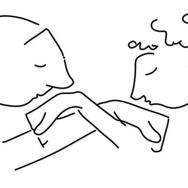Punishing bad behavior can feel good, honorable and righteous. According to new research, the impulse to punish a perpetrator may be even more powerful than the desire to help those who were hurt.
A study co-authored by University of Chicago psychologists found that third parties who observe social rejection are more inclined to punish the perpetrators than they are to help the victims. Even among those who reported a history of being bullied, study participants appeared more motivated by “empathetic anger” at the perpetrator than by sympathy for the victim.
“What do people do in those cases?” said Stephanie Dimitroff, AM’15, PhD’18, the lead author of the study, recently published in Emotion. “What explains why they might punish the rejector or help the rejected? That was the underlying notion of what we wanted to study.”
Now a postdoctoral scholar at the University of Konstanz, Dimitroff conducted the study as a graduate student at UChicago, collaborating with Asst. Prof. Greg J. Norman, a senior author on the paper.
“This study helps us understand the psychology that is going on when you watch someone else being treated unfairly and have to decide what to do,” said Norman, an expert in the psychology and neurobiology of stress. “You’re not in danger, but you observe something negative happening to someone else. How do people respond to such circumstances?
“This type of question has been a topic of investigation in psychology for well over a century, and we still have a lot to learn.”
The researchers surveyed 83 individuals between 18 and 25 years old, asking them to complete a set of psychological questionnaires. Those participants recorded one-minute speeches about their morning routines—a purposely unemotional topic. Researchers then pretended to share the clip with two participants in other rooms, but in reality, returned with pre-recorded videos of similar speeches.
The participants watched those pre-recorded videos and were asked to rate them across various dimensions including intelligence, attractiveness and likability. Participants then received fake questionnaires ostensibly written by the people in other rooms—with one being especially harsh and overtly unfair to the other.
“The point is that the feedback is clearly unfair,” Norman said. “It’s more than someone just being mildly critical. Because the video is so brief, the ‘individual’ providing negative feedback has insufficient information to be that harsh. The severity and unfairness is really what makes it akin to bullying or rejection.”
In the second phase of the experiment, researchers told participants to take part in interactive computer tasks with the two participants in the other rooms—not revealing that those two partners were simulated. When simulated co-players made mistakes during the first task, study participants chose the intensity of the sound blast delivered as punishment. The second task allowed participants to distribute $10 among themselves and their two co-players.
Compared to a control group, participants who reported feeling upset with the individual who provided harsh feedback chose to punish them with a significantly louder sound blast. They also gave less money to those “rejectors” than they did to the “victims” who received the poor reviews. Those results were even more pronounced for those who had reported a history of being bullied.
However, the study found that feeling sorry for the victims did not correlate with changes in the participants’ behavior.
“For someone who had a past history of bullying, you might expect the exact opposite,” Norman said. “That person may be particularly sensitive to the feelings of the victim and go out of their way to help them. However, the results of the study suggest that having a history of being bullied increases one’s willingness to punish the perpetrator, without significantly altering behavior towards the victim.”
Other co-authors on the study were Jean Decety, the Irving B. Harris Distinguished Service Professor and a leading scholar on the cognitive science of moral reasoning; UChicago graduate student Kelly E. Faig; UChicago alum Karen E. Smith, AB’11, PhD’18, now a postdoctoral fellow at the University of Wisconsin; and University of Wisconsin graduate student Ethan G. Harrod.
Norman and his colleagues hope to further this field of research by studying the affective processes that drive helping and punishing behaviors following observed social rejection and bullying. Their future work will also examine how psychological stress may influence one’s willingness to help or punish following observed bullying.
Citation: “Third-party punishment following observed social rejection,” Dimitroff et al., Emotion, advance online publication. DOI: 10.1037/emo0000607

